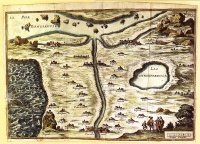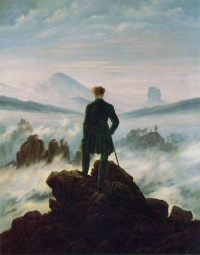Travel
From The Art and Popular Culture Encyclopedia


|
"Travel is useful, it exercises the imagination. All the rest is disappointment and fatigue. Our journey is entirely imaginary. That is its strength."--epigraph Journey to the End of the Night (1932) by Louis-Ferdinand Céline "A little beyond this, we got into a sea, not of water, but of milk; and upon it we saw an island full of vines; this whole island was one compact well-made cheese ... The vines have grapes upon them, which yield not wine, but milk." --A True Story (2nd century) by Lucian |
|
Related e |
|
Featured: |
Travel is the movement of people between distant geographical locations. Travel can be done by foot, bicycle, automobile, train, boat, bus, airplane, ship or other means, with or without luggage, and can be one way or round trip. Travel can also include relatively short stays between successive movements, as in the case of tourism.
The word originates from the Middle English word travailen ("to toil"), which comes from the French word travailler ("travail").
History
Travel dates back to antiquity where wealthy Greeks and Romans would travel for leisure to their summer homes and villas in cities such as Pompeii and Baiae.
While early travel tended to be slower, more dangerous, and more dominated by trade and migration, cultural and technological advances over many years have tended to mean that travel has become easier and more accessible. Mankind has come a long way in transportation since Christopher Columbus sailed to the new world from Spain in 1492, an expedition which took over 10 weeks to arrive at the final destination; to the 21st century where aircraft allow travel from Spain to the United States overnight.
Travel in the Middle Ages offered hardships and challenges, however, it was important to the economy and to society. The wholesale sector depended (for example) on merchants dealing with/through caravans or sea-voyagers, end-user retailing often demanded the services of many itinerant peddlers wandering from village to hamlet, gyrovagues (Wandering Monks) and wandering friars brought theology and pastoral support to neglected areas, traveling minstrels practiced the never-ending tour, and armies ranged far and wide in various crusades and in sundry other wars.
In the late 16th century it became fashionable for young European aristocrats and wealthy upper-class men to travel to significant European cities as part of their education in the arts and literature. This was known as the Grand Tour, it included cities such as London, Paris, Venice, Florence, and Rome. However, The French Revolution brought with it the end of the Grand Tour.
Travel by water often provided more comfort and speed than land-travel, at least until the advent of a network of railways in the 19th century. Travel for the purpose of tourism is reported to have started around this time when people began to travel for fun as travel was no longer a hard and challenging task. This was capitalized on by people like Thomas Cook selling tourism packages where trains and hotels were booked together. Airships and airplanes took over much of the role of long-distance surface travel in the 20th century, notably after the Second World War where there was a surplus of both aircraft and pilots. Indeed, air travel has become so ubiquitous in the 21st century that one woman, Alexis Alford, visited all 196 countries before the age of 21.
See also
- Trip, journey, voyage
- Armchair traveler
- Grand Tour
- Imaginary voyage
- Traveling carnival
- Travel literature
- Quest
- Road movie
- Travel guide
- The Art of Travel


